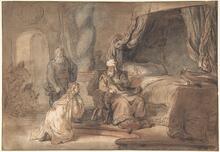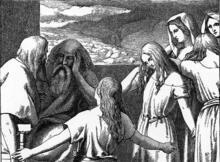Gomer, daughter of Diblaim: Midrash and Aggadah
According to the Rabbis, God commanded Hosea to marry Gomer, the daughter of Diblaim, to teach him proper conduct for one who was to prophesy to Israel. Despite Gomer’s harlotry, the Rabbis interpret her story as proof that, even when God is angry with Israel, God still loves Israel. Hosea’s bond with Gomer is reflective of God’s bond with Israel. This is reflected by the prophecies of Hosea, which vary between harshness and conciliation. Some rabbinic sources interpret this story as purely allegorical, while others view it as a factual recounting.
According to the Rabbis, God commanded Hosea to marry Gomer, the daughter of Diblaim, to teach him proper conduct for one who was to prophesy to Israel. Gomer was a harlot; her name is indicative of her occupation, since everyone would sate (gomer) their lusts with her. “Diblaim” is derived from the word develah (fig-cake), since she was as sweet in everyone’s mouth as a fig-cake; or because everyone would tread on her as on a fig-cake. Gomer’s mother also engaged in the same profession and both were commonly the subject of slander and gossip. This led to another midrashic position, that the name “Diblaim” is a plural form of the word dibah (slander, ill repute): [a woman of] ill repute and the daughter of [a woman of] ill repute; like mother, like daughter (BT A seven-day festival to commemorate the Exodus from Egypt (eight days outside Israel) beginning on the 15th day of the Hebrew month of Nissan. Also called the "Festival of Mazzot"; the "Festival of Spring"; Pesah.Pesahim 87a-b).
Israel and Gomer
When God told Hosea “Your children have sinned,” He expected Hosea to ask for divine mercy for them, saying: “They are Your children, the children of Your beloved ones, the children of Abraham, Isaac and Jacob; extend Your mercy to them.” Instead of this, his response to God was: “Master of the Universe! The whole world is Yours. Obliterate them, exchange them for another nation.” God then asked: “What shall I do with this old man? I will command him: Go and marry a harlot and beget the children of harlotry, and then I will tell him to send her and her children away. If he is able to send them away, then I, too, will send Israel away.”
After two sons, Jezreel and Lo-ammi (“You are Not-My-People”), and a daughter, Lo-ruhamah (“she who has not received compassion”), were born to Hosea and Gomer, God ordered Hosea: “You must part from Gomer. You should have learned from your teacher Moses, who parted from his wife because I revealed Myself to him. You, too, separate yourself from her.” Hosea began to weep and said to God: “Master of the Universe! I have children by her. I can neither send her away nor divorce her!” Since he answered Him thus, God said: “Hosea, why do you weep?” He replied: “I take pity on my wife and my children.” God said: “Your wife is a harlot, and your children are children begotten of harlotry, and you do not know if they are yours or from others; nevertheless, you took pity on them. And as for Me—Israel are My children, my beloved children, the seed of Abraham, Isaac and Jacob. Should I not have pity on them? Israel is one of the four possessions that I have acquired in this world [i.e., the Torah she-bi-khetav: Lit. "the written Torah." The Bible; the Pentateuch; Tanakh (the Pentateuch, Prophets and Hagiographia)Torah, heaven and earth, the Temple, and Israel], and you tell me to replace them with another nation?!”
Hearing this, Hosea realized that he had sinned and was about to ask for Divine mercy for himself. God told him: “Hosea, Hosea, three [heavenly] decrees were issued against Israel because of you. Instead of asking for mercy for yourself, ask for mercy for Israel.” Hosea stood and prayed on behalf of Israel. God then annulled the three decrees and Hosea gave them three blessings: “The number of the people of Israel shall be like that of the sand of the sea” (Hos. 2:1); “instead of being told, ‘You are Not-My-People,’ they shall be called ‘Children-of-the-Living-God’” (Hos. 2:1); “I will sow her in the land as My own; and I will have compassion on her who has not received compassion; and I will say to those who are not My people, ‘You are My people’” (Hos. 2:25) (BT Pesahim 87a–b; Seder Eliyahu Zuta 9; A type of non-halakhic literary activitiy of the Rabbis for interpreting non-legal material according to special principles of interpretation (hermeneutical rules).Midrash Statements that are not Scripturally dependent and that pertain to ethics, traditions and actions of the Rabbis; the non-legal (non-halakhic) material of the Talmud.Aggadah [ed. Buber], Lev. 16:30).
This narrative teaches that Hosea was emotionally attached to Gomer and felt obligated to her. God tried him when He told him to part from her and her children, but He did not intend this order to be fulfilled. Rather, Hosea was to learn from the husband and wife relationship the emotions of love, compassion, and commitment that a prophet must feel for his people.
The Prophecies of Hosea
Another tradition relates that for every affliction that Hosea prophesied for Israel, he gave them a remedy. After telling Israel “I will no longer pardon the House of Israel” (Hos. 1:6), the prophet promises “I will have compassion on her who has not received compassion.” After having told the Israelites “For you are not My people” (Hos. 1:9), the prophet assures them “I will say to those who are not My people, ‘You are My people’” (Hos. 2:25). The mouth that uttered “For she is not my wife” (Hos. 2:4) recanted and amended “You will call [Me] Ishi [husband]” (Hos. 2:18).
The same mouth that uttered the dire prediction: “I will make her like a wilderness” (2:5) then says, in an amelioratory vein, “I will lead her through the wilderness” (2:16). The harsh characterization of “So they conclude agreements and make covenants with false oaths” (10:4) is followed by “Take words with you” (14:2). Although “Israel has balked like a stubborn cow” (4:16), nonetheless, “instead of bulls we will pay [the offering of] our lips” (14:3). The forbidding “They have not turned back to their God the Lord” (7:10) is to be undone by the call in 14:2: “Return, O Israel, to the Lord your God” (Pesikta Rabbati 44).
These striking contrasts in Hosea’s prophecies are seen by the Rabbis as indicating that even when God is angry with Israel, He still loves them, just as Hosea still loves Gomer, despite her harlotry. The Rabbis elucidate this with a parable of a king who is angry with his wife and declares: “I shall divorce her, and I have no pity for her children; she is not my wife, and I am not her husband.” The king then went forth to the marketplace and ordered a jeweler to fashion gold ornaments for his wife. The king’s friend heard this and told it to the wife’s neighbors. He said to them: “Do you think that she is no longer his wife, just because he said such things?” Hosea delivered a similar message to the non-Jewish peoples: What, do you think that because of God’s ire, Israel is no longer His people? If God is so affectionate to them when irate, how much greater is His love when He is favorably disposed to them” (Num. Rabbah 2:15). This parable teaches that even when God is provoked by Israel, He still loves them. Hosea learns this himself when he realizes that Gomer’s harlotry does not prevent him from being attached to her.
In contrast to the approach that views the prophet’s marriage to Gomer as fact, another approach considers it to be allegorical. According to this opinion, the marriage narrative is a prophetic vision experienced by Hosea, which never occurred in reality (Midrash Aggadah [ed. Buber], Lev. 16:30). This allegorical interpretation can fit the tradition that explains the name “Gomer” as reflective of the condition of Israel, since at that time the Aramean king sought to destroy (li-gmor) the wealth of Israel, as depicted in II Kings 13:7: “For the king of Aram had decimated them and trampled them like the dust under his feet” (BT Pesahim 87b).











